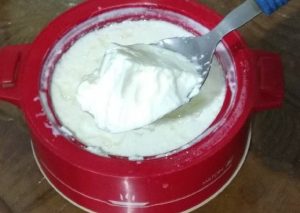Yogurt or curd is very popular in India and is easily found in most homes. It has more benefits than we may be aware of. It is a milk product and is made by a natural process. The lactose in milk is converted into lactic acid. With fermentation, the milk becomes yogurt, or curd. As far as beauty is concerned, yogurt is also very important for the hair, when it is a part of the diet.
Yogurt is rich in vitamins and minerals, like Vitamins A and B, calcium, iron, potassium, phosphorous. Being a milk product, it can also meet protein requirements and protein is very necessary for the hair, as the hair is made of a protein matter. Therefore, taking curd daily can ensure the supply of valuable vitamins and minerals, which are necessary for the health of the skin and hair. In fact, in some cases of hair loss, taking sprouts and curd daily has helped to control the condition.

Yogurt has been traditionally used for hair care by Indian women. There are references to the use of curd for hair care in Ayurvedic texts, in hair packs. In fact, it can also be applied only by itself for hair benefits. Apply it about half an hour before shampoo. Not only does it restore the acid-alkaline balance, but gives body to the hair, being a protein. It coats each hair and thus adds both strength and body. While using henna for conditioning, curd can be added. Along with henna, curd helps to restore health to the hair, soften it and add body. In India, washing the hair with curd and “besan” is still a popular practice.
While mixing henna for conditioning the hair, you can add curd. Add 4 tsp each of lemon juice and coffee, two raw eggs and enough curd to the henna powder, mixing it into a thick paste. Apply on the hair and wash off after an hour. If you do not wish to use egg, add more curd. As already mentioned, curd by itself can also be applied on the hair before shampoo. Curd has several benefits for the hair. It helps to soften and condition the hair. It also adds body to the hair. It is said to help in checking dandruff and restores health to the hair by restoring the pH balance of the scalp. Dry hair benefits from curd. In fact, dry hair may be prone to split ends. Applying curd nourishes the hair and helps to repair split ends.
Hair that has become dry, rough, brittle and damaged due to use of chemical dyes and lotions for perming or straightening, would also benefit from the application of curd. In fact, even if there are eruptions on the scalp, add turmeric to the curd and apply on scalp. Wash off with plenty of water after 15 minutes.
Dry hair, as well as hair that has become rough and damaged due to use of chemical lotions and colourants, would particularly benefit from the application of curd.
If there are eruptions, turmeric may be added to curd and applied on the scalp. Wash off with plenty of water after 15 minutes. In fact, the hair should be rinsed very well after applying curd to get rid of all residues that may be sticking to the scalp.
For dry hair: Mix curd with egg and apply on the hair. Wash it off after half an hour.
For oily hair: Add the juice of a lemon and egg white to curd and use as a hair pack. Wash it off after 20 minutes with plenty of water.
For dandruff: Add 4 tsp each of lemon juice and coffee, two raw eggs, one teaspoon methi seed powder and enough curd to the henna powder, mixing it into a thick paste. Apply on the hair and wash off after an hour.
For chemically treated hair: For dry and damaged hair, due to chemical treatments, deep condition the hair by mixing together one egg, two tablespoons castor oil, the juice of a lemon and curd. Apply this on the hair, wear a plastic shower cap and leave on for half an hour. Then wash the hair.